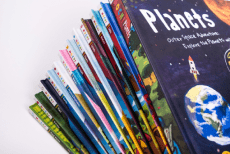What is the Montessori Method?
The Montessori is a method of imparting education and a philosophy of teaching for children from birth to the age of twelve. This method of teaching is fairly different and unique when compared to the mainstream form of educating children of similar ages.
Some of the striking differences are:
- The children do not have to study according to a fixed curriculum provided by the school. They can learn the subjects they want to and at the pace they feel comfortable with.
- The study material is not the same for every child in the class but rather specialized to every student as per their chosen subjects
- Unlike traditional classes, the children of a class taught by the Montessori method need not be of the same group.
- No specific time limit for a project and no fixed scheduling of classes in the Montessori method. The child can learn for uninterrupted work cycles.
The Beginnings of the Montessori Method
This method was introduced and developed by an Italian physician Dr Maria Montessori. She had started propagating education by her unique method in 1906, at a child care centre in the city of San Lorenzo, in Rome. The centre was called the ‘Casa dei Bambini’, which stands for “Children’s House” in Italian. She was working with some of the disadvantaged and unschooled children of the locality and observed that they had shown great interest in engaging in hands-on experiences and had soon developed the ability to concentrate for extended periods and exhibit peaceful behaviour. The success of the first Casa dei Bambini led to the opening of a second and a third Casa in the year 1907, in San Lorenzo and Milan, respectively.

Some Montessori Alumni
There have been many famous and noteworthy personalities who have been educated through the Montessori Method and dedicate parts of their success and character development to this particular method of education.
Some famous Montessori students are:
- Jeff Bezos (Founder of Amazon)
- Stephen Curry (NBA player)
- Taylor Swift (American singer)
- Prince William (Duke of Cambridge, member of the British royal family)
- Prince Harry (Duke of Sussex, member of the British royal family)
- Larry Page and Sergey Brin (Founders of Google)
- Anne Frank (German diarist)

Pros and Cons of the Montessori Method
Pros
- The children interact and learn with mixed age groups which help in building their social skills such as leadership.
- Children can choose what they want to learn and at their own pace.
- The teachers observe, assist and guide the children only when required, which helps in giving the children confidence and the feeling of being independent
Cons
- The cost of enrolling a child in a Montessori school is comparatively expensive since most of them are private schools, and the specialized curriculum and teachers involve higher costs.
- Any school can call themselves to be a Montessori-method based school since it is not exactly patented. Many schools might be so-called Montessori ones.
Different Stages to the Montessori Method
Montessori schools are segregated into different age groups. There are roughly 4 or 5 age groups ranging from infants below three years old to teenagers up to 15 years old.
The stages can be broadly classified as:
- Toddler(Birth- 3years)
- Primary(3-6 years)
- Elementary(6-12 years)
- Adolescence(12-15years)
During the first two stages(up to 6 years), Dr Montessori believed that the children have an ‘absorbent mind’, during which they can easily and readily absorb and learn from the environment and the surroundings around them. Hence, the Montessori classroom for this particular age group must be a well prepared, engaging, and nurturing environment for the child. The child is guided and encouraged to perform daily tasks independently and is given the freedom for imaginative exploration which lets them express themselves completely.

In the elementary years, which can sometimes be further divided into lower elementary(6-9 years) and upper elementary(9-12 years), more focus is given to developing the child’s intelligence. They are taught discipline and confidence and henceforth develop the ability to concentrate for longer periods. Children are made to develop a social conscience and an idea of the general society by introducing them to outdoor activities and tasks such as volunteering, charity or some other social service.
The Montessori method of education is different compared to the traditional method in ways more than one- be it the teaching method, the learning materials, the syllabus(or the absence of one), to the varied ages of children who study together in the same class.

The founder of Amazon, Jeff Bezos, launched a non-profit organization in 2020 called the ‘Day 1 Academies Fund’ which aims to launch Montessori inspired preschools in underserved communities. The first school was launched last October, with plans made for five more schools to be made. And when the world’s richest person places such great importance on the Montessori method of teaching, you know it’s a great place for your child.





